 |
The manual, launched by the National Cyber Security Monitoring Center of the Ministry of Information and Communications, enhances information security skills for users when operating in cyberspace.
According to the handbook developer, the prolonged Covid-19 epidemic has made information exchange, online learning, remote work and online shopping mandatory. During social distancing, users receive a lot of information and updates about the Covid-19 pandemic and often pay little attention when accessing this information. This is the gap that hackers take advantage of to conduct attacks.
The manual points out 10 things to know when working remotely, such as installing strong passwords with 8 characters or more, including letters, numbers, uppercase letters and special characters; enabling firewalls, updating software and operating systems, installing anti-malware software, encrypting and backing up data; being careful with emails, the sender's address, scanning virus before opening attachments; being careful when plugging in USB and removable storage devices of unknown origin; and being aware of requests for money transfer.
For safe online learning, the manual offers seven suggestions: Users need to control who participates in meetings or online classes to prevent criminals from stealing information and spreading malicious code through shared files/links; set a password to restrict impersonated access; update new version; and be careful when sharing files.
The handbook also offers guidelines to ensure safety when using video conference software, connecting video calls, online chat, and using wireless networks.
Users can find effective ways to use popular social networks (Facebook, Zalo, TikTok) in the safest way from this manual.
Specifically, those who use Facebook are advised to delete activity history, hide user locations, enable two-factor authentication, limit viewers for individual posts, and remove tracking applications from Facebook.
For TikTok, users should prevent TikTok from saving login information, checking for abnormal logins, and setting privacy.
For Zalo, users should create a secure pin, set up a Zalo private source, turn off notifications for seeing messages, set up viewing permissions when logging in, and delete locations on this app.
|
The Ministry of Information and Communications has issued a directive on promoting the development and use of safe and healthy digital platforms. The directive is also expected to contribute to creating digital trust and ensuring the safety of Vietnam's cyberspace. Over the past times, digital platforms have made important contributions to the national digital transformation, and the development of the digital economy and digital society. However, information and data leakage on digital platforms still occurs on an increasingly large scale. The spread of fake news, information that violates the law, especially on cross-border digital platforms, has caused a lot of negative impacts. Therefore, the ministry requires businesses that manage digital platforms to develop the platforms that are able to protect themselves and have tools to process and remove information that violates the law. In particular, owners of digital platforms must implement solutions to ensure information security and publicise measures to handle and protect personal information, and collect personal information only with the consent of the users. These units are not allowed to provide, share or distribute personal information of users, except with their consent or at the request of competent state agencies. VNA |
H.N.

New online scams related to pandemic reported
Taking advantage of people's anxiety about health during the Covid-19 pandemic, criminals have committed new forms of fraud and profiteering through cyberspace.

CyberKid Vietnam joins hands with global security firm to protect children online
CyberKid Vietnam is the first social organization in Vietnam with 100% Vietnamese ideas, owned and operated by Vietnamese to protect and support Vietnamese children in cyberspace.